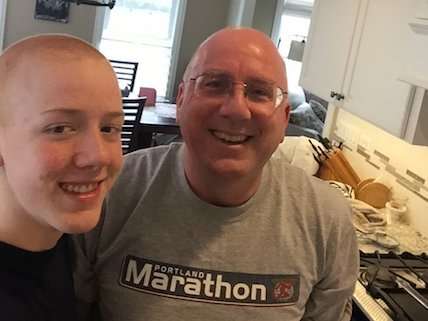16-Year-Old Commits Suicide After School Cop Threatens Him with Child Porn Charges
"I think they wanted to scare him straight. Instead, they scared him to death."

It took school and police officials just a few minutes to extinguish 16-year-old Corey Walgren's promising future. All they did was utter two words: child pornography.
Corey, a junior at Naperville North High School in Naperville, Illinois, was a perfectly normal, social, good-looking 16-year-old. He was an honor roll student with dreams of attending a Big Ten college. He had typical interests for a teenager boy: hockey, fishing, and, yes, girls.
Corey committed suicide in January, just hours after a school resource officer confronted him about an alleged illegal item on his cell phone—a recording of Corey having sex with a female classmate. The girl had informed a dean at the school that she believed Corey had played the recording for his friends (it's not clear whether he did), which prompted the authorities to summon Corey to the principal's office. They called his mother and told both of them that Corey was being investigated for possession of child pornography.
Corey left the meeting, headed to a nearby parking garage, and jumped.
That's all according to a heartbreaking story in The Chicago Tribune, which obtained police records of the case and spoke with Corey's parents about his death.
"I think they wanted to scare him straight," Corey's mother, Maureen Walgren, told the Tribune. "Instead, they scared him to death."
Naperville Police Chief Robert Marshall offered his condolences but declined to criticize the process that resulted in Corey's death.
"At the time of the incident, the Police Department determined that the school resource officer followed proper policies and procedures," he told the Tribune. School district officials made similar remarks.
The Tribune story casts some doubt on this assertion. It isn't entirely clear that the school resource officer had legal cause to question Corey without first asking a parent for permission. But most young people are not well-versed in constitutional law. They don't understand that talking to a cop isn't like talking to a regular school official, that it involves forfeiting certain rights.
The video recording was apparently of such poor quality that it was impossible to make out any of its images. But under Illinois's age of consent laws, one person under the age of 17 can be charged with sexual abuse if he had sexual contact with another person under the age of 17, even if they're both the same age. Two 16-year-olds in a fully consensual relationship could be charged with abusing each other.
The authorities probably wouldn't have charged Corey—in most cases, accused teens are able to work out plea deals involving probation and diversion programs. Note, though, that these deals are still incredibly disruptive of young people's lives and education plans.
Maybe Corey walked out of the meeting terrified that he was about to be branded a sex offender for the rest of his life. Maybe he was worried that he would no longer graduate on time or go to college. Maybe he just didn't want to face his parents. We'll never know exactly what Corey was thinking when he decided to end his life.
We do know that the practice of employing police officers to patrol public schools is fraught with abuse. More kids are arrested, and even jailed, for behavior that would have earned them detention in saner times.
We also know that treating kids like sex criminals for taking inappropriate pictures and videos of each other is bad for everyone involved. Teenagers should be allowed to make mistakes, learn better behavior, and move on without ending up on the sex offender registry—without feeling like their lives are over before they've even finished growing up.
On a more encouraging note, Austin Yabandith—a high school kid facing child pornography and sexual assault charges stemming from a consensual relationship—will graduate this Saturday. Austin's situation was improved by the publicity generated from Reason's coverage of his case, which helped the family raise money to hire a lawyer. "You did the story justice and helped us out a whole lot," Austin's mother wrote to me.


Show Comments (261)